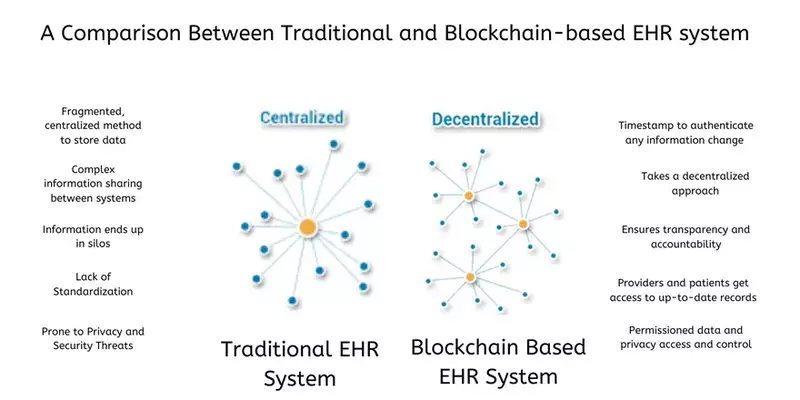-
Medical professionals tend to take EHRs as a necessary evil. They struggle to work with legacy, clogged, and slow EHR systems. They can't quit using them as these systems have become a necessity. Essentially, EHRs aggregate patient data from different sources and enable physicians to make more informed decisions and provide the best possible care to patients. However, legacy EHRs systems are inefficient and clumsy. They fail when it comes to data analysis, security, and interoperability, and giving patients access to their information. One technology that can address these pitfalls is already here.
We are talking about blockchain-based healthcare solutions. At Oodles, our blockchain experts believe that blockchain for healthcare is going to be the next go-to-technology. Here's why they think so.
Blockchain Technology and EHRs
Blockchain applications and solutions have already become the desired addition to several clinical and pharmaceutical operations. Health organizations are using them to establish end-to-end drug supply chain tracking, validate clinical trial results, and prevent health insurance fraud. Similarly, Blockchain implementation in EHRs can revamp several traditional data management standards and provide three new methods for tech-driven care delivery.

Protection of EHRs, Including Personal Health Information
Ensuring data security is an almost inescapable challenge for healthcare providers with multiple ransomware threats, breaches, and APTs arising every year. EHRs are always at risk due to being the primary, centralized source of storage for most comprehensive patient information. Blockchain avoids security concerns with EHRs by providing two significant differences from legacy databases. First, it brings decentralization in the network and distributes data copies among several nodes installed across different locations. Second, it makes data immutable through encryption and cryptography mechanisms. It means nobody can modify or delete the information once stored on the blockchain while keeping it transparent to everyone. In any unauthentic or illicit attempt to change information, it can trigger necessary security protocols, and make the whole network to avoid or eliminate it.
Data Control and Access in the Hands of Patients
Patients must have control over their health data. The increasing healthcare consumerism era turns this need into demand. Regulations like HIPPA and PHi restricts patients from accessing EHRs and limit their ability to review and share their data with other care team members. Blockchain can finally put patients in control of their data by enabling access to EHRs through a fine-grained permission system. It can provide a digital signature for each patient information block using a hash, a private key, and a public key, which acts as an authentic patient ID. With the addition of permission layers to these identities and blockchain APIs, patients can control and limit access to their data. They can choose what to share and what not, such as exposing only specific bits of information with a particular medical entity for healthcare.
Streamlined Healthcare Information Exchange
Undoubtedly, EHRs systems in the current healthcare IT infrastructure lack efficient healthcare information exchange support. They become useless when patients need care from multiple healthcare providers from different health systems or a few facilities under one umbrella. During data transfer, providers generally print requisite information and send patients with loads of papers to another care team.
Blockchain-powered EHRs enhance this situation by eliminating intermediaries from the process and keeping PHI secure yet auditable for authorized personnel. Consequently, other care team members get quick access to patient data, without revealing any personal or sensitive information. It assists them in preventing medical errors like duplicated tests, misdiagnosis cases, counterfeit drug interactions, and delayed care delivery.
Will Blockchain-powered EHRs prove to be the Panacea?
Presently, blockchain is a prominent technology capable of strengthening EHR systems and making it a full-fledged center of tech-driven care. Recent developments in the blockchain implementation for the healthcare industry signify that its adoption rate will likely increase. Startups have already begun investing in blockchain for mobile EHR apps for improved health care and provide data control capabilities to patients. If you're looking to explore blockchain's advantages in EHR management, connect with our blockchain team for insightful guidance. Oodles is a blockchain app development company proficient in utilizing multiple blockchain technologies to create diverse industrial solutions.

Our Offices
INDIA
Emaar Digital Greens, Sector 61,
Gurugram, Haryana
122011.
Welldone Tech Park,
Sector 48, Sohna road,
Gurugram, Haryana
122018.














